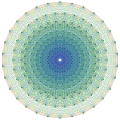Difference between revisions of "File:E8 Polytope.svg"
(→See also: TED talk about an E8-based 8-dimensional universe) |
(bit more info) |
||
| Line 6: | Line 6: | ||
The configuration in eight dimensions is called the Gossett polytope 421. You can read all about it and see many more intricately beautiful pictures in the book "Regular complex polytopes" by H.S.M. Coxeter. | The configuration in eight dimensions is called the Gossett polytope 421. You can read all about it and see many more intricately beautiful pictures in the book "Regular complex polytopes" by H.S.M. Coxeter. | ||
| + | |||
| + | [https://www.youtube.com/watch?v=r_w408y_3rw Klee Irwin explains] that E8 can can be formed from the points at which eight dimensional spheres kiss when they're arranged in their most dense and efficient packing in eight-dimensional space. E8 is also the largest exceptional (has a finite set of reflections) Lie Group that. All [https://www.youtube.com/watch?v=ciM6wigZK0w sphere packing] based on 60 degreee angles (tetrahedral) explode to infinite reflections after eight dimensions. | ||
== See also == | == See also == | ||
Latest revision as of 05:01, 30 November 2020
This is a picture of the root system of type E8, projected from 8 dimensions down to 2. Picture by John Stembridge, based on a drawing by Peter McMullen.
In eight dimensions each root is a vector of the same length (often chosen to be the square root of 2). In this projection, some of the vectors are shorter. In fact there are 30 vectors of the greatest possible length (the small dots on the outer circle), 30 of the next greatest length, and so on. There may appear to be lots more than eight circles of dots; many of the smaller ones are visual artifacts of intersecting lines in the drawing.
Each root is connected by a line to its 56 nearest neighbors, each of which is at distance square root of two; so two adjacent roots and the origin make an equilateral triangle in eight dimensions. After projection to two dimensions, pairs of these 56 lines coincide, so you see only 28 lines coming out of each root image. The picture does not show lines from the origin to each root.
The configuration in eight dimensions is called the Gossett polytope 421. You can read all about it and see many more intricately beautiful pictures in the book "Regular complex polytopes" by H.S.M. Coxeter.
Klee Irwin explains that E8 can can be formed from the points at which eight dimensional spheres kiss when they're arranged in their most dense and efficient packing in eight-dimensional space. E8 is also the largest exceptional (has a finite set of reflections) Lie Group that. All sphere packing based on 60 degreee angles (tetrahedral) explode to infinite reflections after eight dimensions.
See also
File history
Click on a date/time to view the file as it appeared at that time.
| Date/Time | Thumbnail | Dimensions | User | Comment | |
|---|---|---|---|---|---|
| current | 00:15, 4 November 2007 |  | 800 × 800 (110 KB) | Nad (talk | contribs) | Category:PhysicsCategory:Nad |
- You cannot overwrite this file.
File usage
There are no pages that link to this file.







